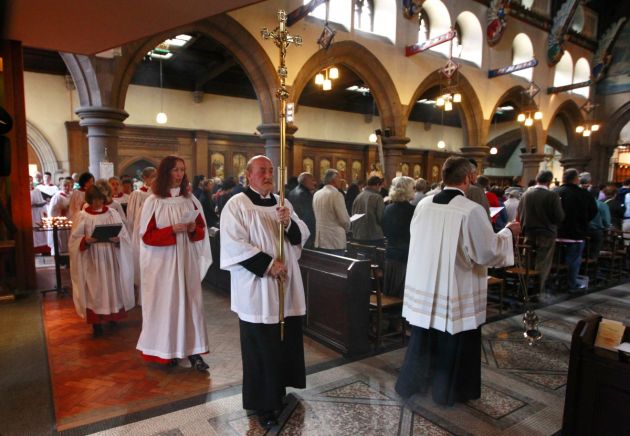Scotland's churches mull civil rite, then blessing, after gay marriage bill

The two major churches in Scotland, the (Presbyterian) Church of Scotland and the Catholic Church believe that marriage is between a man and a woman.
Proposed legislation allowing for gay marriage may unfurl a new system similar to that of France where all couples who get their marriage blessed in a church first take part in a civil ceremony recognised by the State.
The two churches have been in a quandary since the passing of legislation by the British Parliament that will recognize same sex marriage which may push them into seeking a similar model to France for churches involvement in marriage.
The introduction of gay marriage may mean Catholics in Scotland will exchange their vows twice, once in a registry office and once at the altar, the new Archbishop of St Andrews and Edinburgh was quoted as saying by The Scotsman newspaper on September 30.
Archbishop Leo Cushley said the Catholic Church may have to consider the move to avoid legal challenges over the Catholic Church's opposition to same sex weddings.
"We would always bless Christian marriages. It's whether or not we would bless them in conjunction with the State," said the archbishop in an interview with The Scotsman. "You are rolling two things together into one ceremony, the blessing of the union and then the State's recognition of that union."
The Bishops' Conference of Scotland believes the Church may one day have to adopt the French approach under which religious couples take part in a civil marriage recognised by the State in town halls, then exchange rings and receive a blessing in church.
"There are Catholic countries like France, where they are two separate things and have been since the French Revolution and the separation of Church and State," said in his newspaper interview.
"It's not impossible to imagine such a thing here in the future."
On its website the Church of Scotland suggests a similar type of arrangement to that reported in the Scottish newspaper noting that the church has said there are no plans for it to stop conducting marriages.
The Church of Scotland's 2013 General Assembly instructed a number of church committees to work together to explore whether marriages could be celebrated in the way the church does so now.
The convener of the Legal Questions Committee Rev. Dr Alan Hamilton said, "Marriage is a binding force for good and will continue to be so for many years and generations to come."
Hamilton responding after a meeting in September of a committee in the Scottish Parliament where the Church of Scotland spoke to and gave its stance on proposed legislation which would legalise same sex marriages.
Hamilton said, "As the largest provider of religious marriages in the country, more than 5,500 in 2012, we hold to the historical understanding held by most Christians around that world that marriage is between one man and one woman.
"As politicians consider the bill, The Church of Scotland asks for space for itself and for its ministers to decide whether to celebrate same sex marriages.
"We are simply urging that any legislation if approved is robust enough to protect those who in conscience will not want to conduct such ceremonies."
A decision made at the May 2013 general assembly which has the authority to make laws determining how the Church of Scotland operates, agreed to look over a period of two years at the case for the practice common on the Continent of all marriages being civil but couples having the option of a church blessing afterwards.